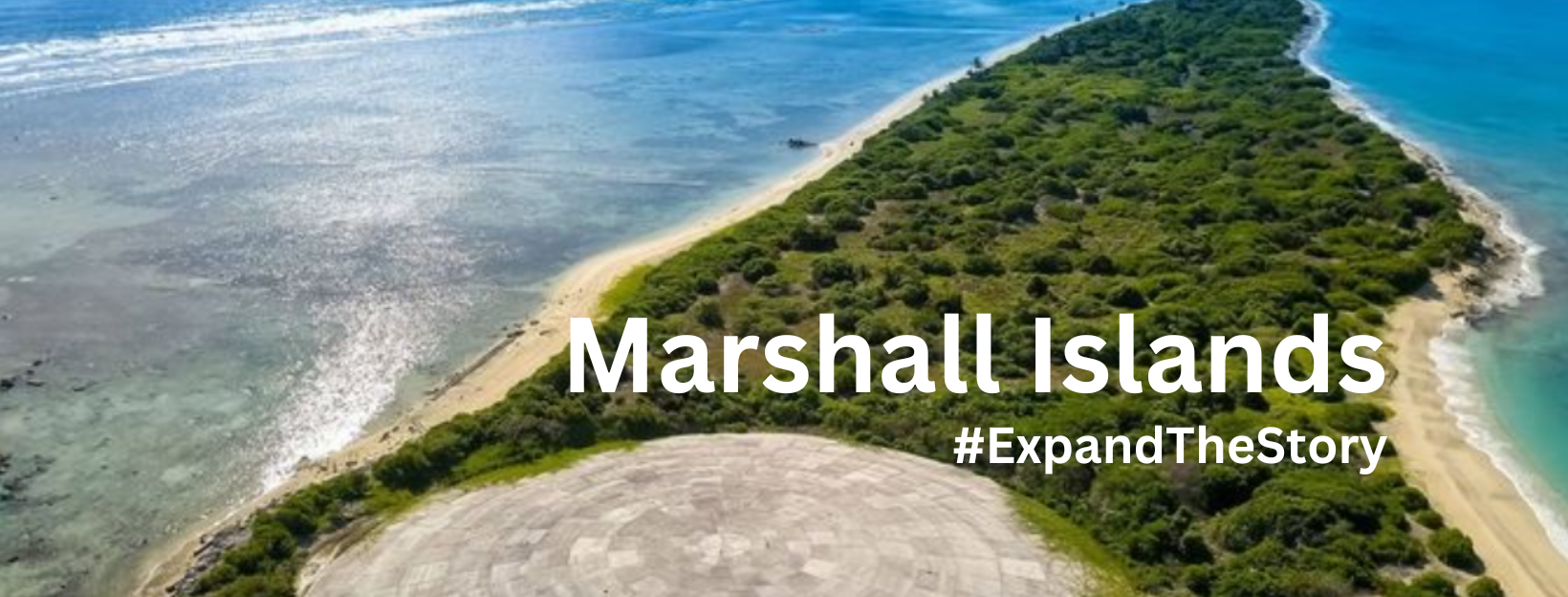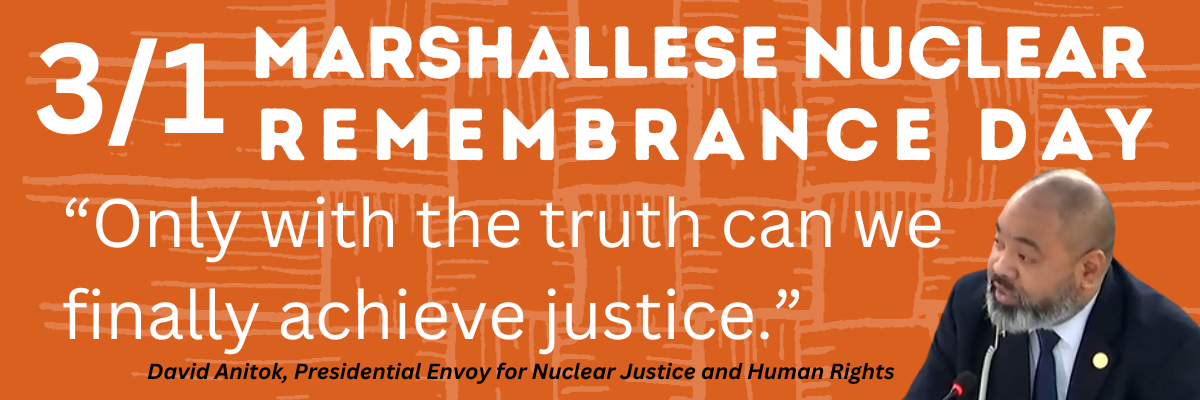We’re inviting you to feel the bomb’s impact on the Marshallese community through this poignant video of Kathy Jetn̄il-Kijiner’s poem, Anointed.
The Marshallese community lives with the impacts of having their home used as testing grounds for 67 nuclear weapons from 1946-1958. Much of the plutonium used in these weapons came from Hanford. This frontline community has much to teach about the burden of nuclear waste in bodies, land, and home; and the power of community to foster strength and resilience.
Despite the challenges facing this community from nuclear contamination, displacement, and climate change, Marshallese leaders are modeling powerful advocacy that centers care for people and the environment for the global community. In 2019, the Republic of the Marshall Islands National Nuclear Commission identified five pillars as part of its strategy for nuclear justice which include: compensation, healthcare, environmental remediation, national capacity building, and education and awareness. Join us as we learn from the Marshallese community to be stronger advocates for human and environmental health. Watch this poem by Luisa Tuilau with interview clips "that gives voice to young Enewetak people and their struggles today."
Here is a starting place to dive into more information about the Marshall Islands. Let us know if you have any favorite resources we can add to our website. For even more resources check out our Marshallese Nuclear Remembrance Day webpage.
Displacement and Out-Migration: The Marshall Islands Experience by Kathy Jetn̄il-Kijiner and Hilda Heine (article) explains the complex relationship between the U.S. and the Marshall Islands in this article for the Wilson Center.
My Fish is Your Fish by Marshall Islands Student Association for the Pacific (video) A student led association based in Suva, Fiji attending the University of the South Pacific and Fiji National University. The #MyFishIsYourFish campaign aims to bring awareness on how the leaking of the "Nuclear Dome" in Runit Island could potentially harm marine resources.
Rachel Hoffman, Marshallese Women’s Association, talking at a Ground Zero event (recorded presentation): We highly recommend taking time to listen to Rachel talk about the impacts of nuclear weapons testing on her Marshallese community. Rachel is an amazing speaker. This is where we first encountered Anointed.
IEP JĀLOK Poems of a Marshallese Daughter, Kathy Jetn̄il-Kijiner (poetry)
“In this stunning debut collection, Kathy Jetn̄il-Kijiner weaves a basket of poems that carry the beauty, depth, and resiliency of her Marshallese culture. Through lyrical, narrative, and visual modes, the poet gives voice to how nuclear testing, migration, racism, and climate change have impacted her family and her people. At the same time, she offers a vision of hope that the future will be a place in which our children—and humanity itself—will thrive.” - Craig Santos Perez, author of from unincorporated territory [guma’]
Unsettling SpongeBob and the Legacies of Violence on Bikini Bottom by Holly M. Barker (article)
For the Good of Mankind by Brian Cowden (documentary)
Nuclear Savage: The Islands of Secret Project 4.1 by Adam Horowitz (documentary)
Radiation Sounds: Marshallese Music and Nuclear Silences by Jessica Schwartz (book)
Interview with Ariana Tibon (podcast), commissioner at Republic of the Marshall Islands National Nuclear Commission and nuclear justice advocate
Why Nuclear Justice for the Marshall Islands is the Biggest US-China Issue You’ve Never Heard Of by Lilly Adams (article)
I walk BRAVO by Luisa Tuilau (poem)
All the way from down here by Luisa Tuilau (video) winner of Asian-Pacific Leadership Network's 2022 Pacific Islands Creative Competition on "Nuclear Weapons and the Climate Crisis"
“Nuclear Fallout: The forgotten veterans who cleaned it up and their fight for justice,” August 2023 (documentary) Video about the United States service men who were sent to the Marshall Islands to clean up contamination in the late 1970s, got sick from their exposure but were not provided benefits or compensation for their illness. The documentary shares their fight to be recognized as Atomic Veterans. The government began planning the cleanup of Enewetak Atoll in the early 1970s, after deciding to return the atoll to the Trust Territory of the Pacific Islands. Approximately 6,000 Veterans participated in the cleanup project, which ran from May 1977 through May 1980.
Making Waves: Rebirth of the Golden Rule (video) A documentary about the historic peace sailboat the Golden Rule, originally launched in 1958 to sail into the nuclear test zone of the Marshall Islands to protest nuclear weapons.


